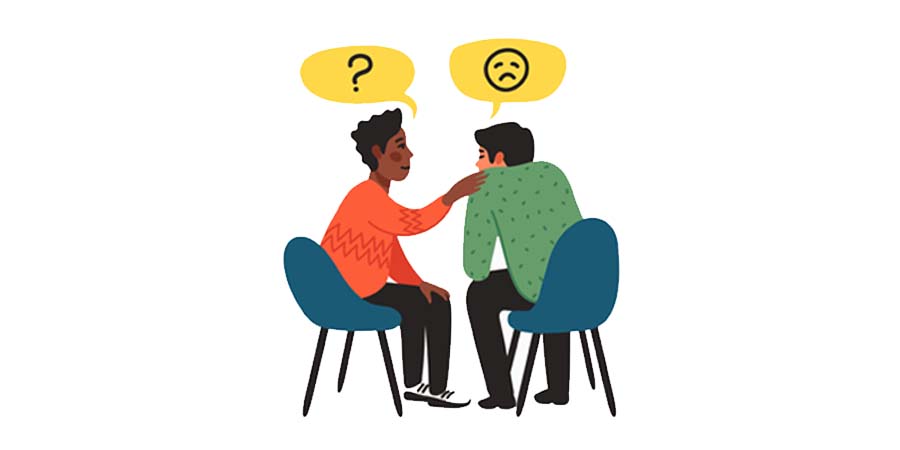Ask the expert: How to practice empathy
By Teresa Mackin
February 11, 2022
Open gallery

Little moments matter. Take, for example, the day of the snowstorm last week. Sara Konrath, an associate professor of philanthropic studies at the Lilly Family School of Philanthropy at IUPUI, looked out her window and realized that her neighbors had left her a baked good on her porch, with a note saying “Happy Snow Day!”
“It meant so much,” Konrath said. “Little acts of kindness make a huge difference. They always did make a difference, but in this ‘dark desert’ of COVID, those little acts mean more, because you just don’t expect it. You don’t see people like you used to see people, or maybe your interactions have changed, and that means those moments are really special now.”
IU Today took several moments to talk with Konrath and Fritz Breithaupt, Provost Professor of cognitive science and Germanic studies in the College of Arts and Sciences at IU Bloomington; both of them study empathy, its meanings and its different forms and stages. We learned a bit more about how powerful it is, and why it’s more important now than ever to have empathy.
Tip 1: Seek opportunities to connect, at least once a day
“Empathy is not a minor feature of human beings,” Breithaupt said. “It’s really what makes us human. Evolutionary biologists typically argue that our brain developed to enable empathy. It’s really who we are.

“Empathy is wonderful in many respects. We are not locked in; we are not alone; we can connect with others and relate to them. When we see something important for them, that affects us; we are a unit, and that means we’re not alone. That’s amazing.
“There is evidence that all different forms of empathy can be cultivated and learned long into one’s life. There’s always an opportunity. This cultivation and learning don’t just happen automatically. We have to focus on practices that allow us to do this.
“I’d challenge people to seek out opportunities to connect with others in some way, one time a day, to deliberately put yourself in another person’s shoes. It’s amazing what empathy will do for you, as well.”
Tip 2: Remind yourself empathy isn’t always easy, and it takes a little effort
“To develop empathy, though, you have to want to,” Konrath said. “And it’s not just for one gender or another. Research shows the capacity is there for everyone.”
“COVID has put incredible challenges on people,” Breithaupt said. “Normal interactions are different. We went through a year where we were suspicious of others, even, having to be 6 feet apart, wearing masks, etc. Now, even just that smile on the street from someone may not be there anymore, and we have to remind ourselves how difficult it’s been.
“When we see another human being, we start to smile; there’s a lot of things that happen automatically. So now we just have to think a bit more about being empathetic, because it may not come as naturally.”

“If we’re in the house looking at a camera on Zoom, it still feels good to talk with others, but it’s not the same as the typical interactions that happen in the grocery store or out and about,” Konrath said. “It’s important to think about other people and what they’re going through, especially as things continue to change. I find it especially rewarding as a teacher this year; those little moments matter to students. When I show them I care or listen to what they’re feeling, hopefully it’s helping them, and it’s also helping me.
“Empathy helps us to be happier and healthier. We have this neurological system that releases hormones that help us to manage our stress. It helps us to be calmer, more connected and less stressed out, even in the midst of difficulty.”
Tip 3: Small effort, big reward: Thinking of others can help restore you
“Two years into a pandemic, it’s OK to not be OK,” Konrath said. “Empathy isn’t always for others; it also includes yourself. Setting up your environment so you’re surrounded by caring people helps you to be empathetic, too. Self-compassion is important.
“Research shows empathy makes you feel good. If you’re thinking of others, it can help restore you. If you feel exhausted or drained, there’s a joy when it comes to caring for others and doing something nice for them.”
Healthy IU has a number of classes and webinars focused on compassion, respect, self-esteem and more, if you’re looking for more information. The IT Leadership community is also hosting a Feb. 18 workshop called Empathy at Work, focused on the different types of empathy and the benefits of empathy in the workplace.
Of course, there are caveats to all of this, and there is such a thing as empathy fatigue and burnout, which many are experiencing during the pandemic, as well. IU has a number of resources and webinars addressing this, and free, confidential counseling and referrals are available 24/7 through SupportLinc Employee Assistance Program by calling 888-881-LINC (5462).